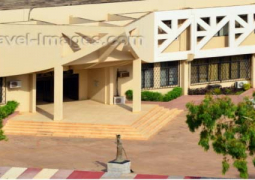The Pan-African Parliament (PAP) at the end of its extra-ordinary session Saturday unanimously adopted a motion calling on the AU to allow the PAP to undertake its own independent election observation missions. According to a decision of the Executive Council of the AU, adopted on 1st February this year in Addis Ababa, PAP is to be part of joint election observation missions with other AU organ under a centralized budget managed by the Department of Political Affairs of the AU Commission. The motion called on the AU to rescind its decision which stopped the PAP from fielding its own missions.
Moving the motion, Member of Parliament from Ghana, Hon. Ambrose Dery said that "PAP must be given a chance to do its own independent election observation missions other than being controlled by AU Commission". He added that the PAP Members of those joint missions are not heard and do not take part in the compilation process of the reports during or after the missions.
Seconding him, South African Member of Parliament Hon. Fatima Haijag said that the AU Commission is appointed, while PAP Members are elected by the people, which make the experiences of the two different when it comes to elections. "We Members have experience because we go through elections and we know how it feels to go through an election. What's the point of PAP being there, and at the end it does not take part in compiling the report," wondered Haijag.
During the debate on the motion, Members shared their experiences during different joint missions describing the arrangement as unworkable. Some MPs argued that the decision by AU on joint missions was meant to suffocate PAP and suggested that they stop going for the missions with immediate effect, saying if they continue to go, AUC will not stop mistreating them. Last week PAP Members expressed their concern over the way they had been treated during the joint missions saying they were not given a chance to contribute.
According to the President of the PAP, Hon. Dr. Moussa Idriss Ndélé, the motion will be taken forward to the Summit of the Heads of State and Government of the AU.
The House was also informed about the Women's Conference which was held on 8th and 9th of this month at the PAP by the President of the PAP Women’s Caucus, Hon. Mavis Matladi. During the conference, issues such as the human rights situation in the occupied territories of Western Sahara, female genital mutilation, maternal and child mortality in Africa and gender responsive budgeting were raised and debated.
Hon. Matladi told the House that the conference has recommended that the Pan- African Parliament encourages all the organs of the African Union, United Nations Security Council as well as the international community to endorse the monitoring of human rights in Western Sahara as mandated by MINURSO. It also recommended that PAP should, among others, send a fact-finding mission to Western Sahara to investigate the human rights violations against women and children, put pressure on the Moroccan authorities to ensure that they engage the POLISARIO Front with the aim of holding a referendum for the people of Western Sahara, and call on the Moroccan authorities to unconditionally release all the Saharawi political prisoners and provide the details about the whereabouts of prisoners who disappeared in the last 35 years.
At the end of the debate on the report, the President of the PAP, Hon. Dr. Moussa Idriss Ndélé indicated that the House has taken note of the report and resolutions of the Women’s Conference organized by the PAP Women's Caucus, and that the issues raised would be taken on-board during the upcoming Sessions.
In her presentation to the House, H.E. Bience Gawanas, AU Commissioner for Social Affairs said that Maternal and Child Health is a cause for concern on the African continent. She cited a number of causes of Maternal and child deaths amongst them, "Weak health systems, delays at different levels in accessing health services, lack of emergency neonatal and obstetric care, inadequate family planning services and complications of unsafe abortions," she explained.
She commended global efforts to address the matter, highlighting in particular the formulation of the Millennium Development Goals (MDGs) during the Millennium Summit in September 2000, where global leaders committed to, "....Spare no effort to free our fellow men, women and children from the abject and dehumanizing conditions of extreme poverty, to which more than a billion of them are currently subjected. We are committed to making the right development a reality for everyone and to freeing the entire human race from want."
Commissioner Gawanas also highlighted the strides that have been made by the continent in developing policy instruments, some of which are the adoption and advocacy for implementation by member states of the legal policy instruments, campaigns and initiatives to address maternal and child health, the Continental Policy Framework on SRHR and the Maputo Plan of Action, and various other initiatives that have come up with ways of addressing the grave issue of Maternal and Child Health.
Going into the future, Gawanas said that Africa must do several things: "Increase advocacy for implementation of cost-effective measures with high impact,.... sharing of experiences amongst the stakeholders on successful practices, ....delivery of quality, comprehensive, integrated and affordable primary health care services.... increasing domestic resources to health through national budged and public-private partnership."
In conclusion, the AU Commissioner for Social Affairs said, "For a better health for Africa, focus must be on integrated, comprehensive and cost effective interventions. The role of Primary Healthcare is still as significant as it was since the Alma Ata Declaration more than 30 years ago."
During the debate on Maternal and Child Health, parliamentarians urged their peers to take action, acknowledging that some countries on the continent have taken the necessary steps to create legislation. They said it was time now for those policies to be implemented, so that lives could be saved. MPs from different regions in Africa echoed the sentiment that it is unacceptable that every day women and children are dying, and that governments remain inactive. Parliamentarians were in agreement that it is the responsibility of all Africans to ensure the health of women and children in order to safeguard the future of the continent.
Facts on Maternal and Child Health:
- An estimated 12,000 children die every day in Africa.
- Every minute, 8 children die from easily preventable or treatable conditions, 2 of the newborns.
- A woman in Africa has a 1 in 16 chance of dying in pregnancy or childbirth.
- Almost 74 percent of all child deaths are attributed to just six conditions: neonatal causes, pneumonia, diarrhoea, malaria, measles, and HIV/AIDS.
- Malnutrition contributes to more than 35 percent of child deaths.
- Malaria threatens a disproportionately high percentage of the population in Africa, with about 350 million episodes annually.
The GDP loss in Africa due to HIV/AIDS is estimated to be between 0.5% and 2.6% annually. In countries with a high prevalence of tuberculosis, economic loss is estimated at between 4% and 7% of GDP annually. Due to the high prevalence of malaria in the past 30 years, Africa's GDP lost as must as USD 100 billion.
• More than 90% of the 430 000 human immunodeficiency virus type 1v (HIV- 1) infections in children each year occur in Africa where HIVI-1 acquisition through breast milk accounts for more than 40% of infections.
Meanwhile, a two-day Women's Conference at the Pan-African Parliament (PAP) themed “Women and the Transformation of the African Continent” closed on Saturday after tackling a number of issues impacting on African women.
Focus areas of the conference included; the Maternal and Child Mortality in Africa, Female Genital Mutilation, Women in Conflict Zones, the Gender Dimension of the Transformation of the Pan-African Parliament and the ratification of the African Charter on Democracy, Elections and Governance.
On the matter of Maternal and Child Mortality in Africa it was emphasized that the number of women dying during pregnancy or child birth is alarmingly high. Vicki Okine from the Fairplay for Africa campaign said “Some governments have created policies to deal with this matter. Policies are great but if no funding is allocated it will become pointless.” She added, “We must not forget that the children we bear for you can take our life.” According to Okine, it is important to tackle Maternal and Child Mortality in Africa and “scrabble” to achieve the Millennium Development Goals of reducing child mortality and improving maternal health by 2015.
Female Genital Mutilation (FGM) is practiced for cultural reasons in many parts of the continent. Activists have spoken against it saying it creates irrevocable harm to young girls. Typically, the procedure is done on young girls up to the age of fifteen. Parliamentarians at PAP pledged their continued commitment to ending the practice. Hon. Rebecca Kadaga, the Deputy Speaker of the Parliament of Uganda told attendees about the success that her country has achieved in trying to curtail FGM. In Uganda any one found guilty of aggravated FGM can get a life sentence and even up to ten years for any who performs the act on themselves. This was met with approving applause.
Addressing the issue of women in conflict zones, the Second Vice President of the PAP, Hon. Mary Mugyenyi, said, “The situation of women and children in conflict zones is a matter of grave concern which calls out to all international communities, but in particular to women parliamentarians who are urged to direct the attention of all African leaders to the plight and suffering of women and children.”
Hon. Mugyeni also commented on the Gender Dimension of the Transformation of PAP into a legislative body, saying, “Reinforcing the powers of the Pan-African Parliament will enable our continent to achieve success in economic and political integration…this transformation will grant women a much more significant position as major political players.” She emphasised that the role of parliamentarians is to facilitate the definition, preparation and application of policies, strategies and interventions which would allow the advancement and protection of women’s and children’s rights.
The Second Vice President also encouraged the women gathered in Midrand to play an active role in ensuring that the African Charter on Democracy, Elections and Governance is ratified. “Our women parliamentarians, academics and members of female organisations of Civil Society, must campaign.”
She drew the conference to a close saying, “We firmly believe that the resolutions and recommendations shall resound favourably with our governments, our parliaments and our peoples, on whose behalf we speak.”
Speaking at the Pan-African Parliament (PAP) 2010 Women’s Platform as a special guest, the Premier of Gauteng Province, Ms. Nomvula Mokonyane, urged African women to be in the forefront of promoting good governance and peace as they are the ones who are hard hit in an event when there are civil wars. Ms. Mokonyane said women should be champions of peace as they are the ones who were abused when civil wars break. “The greatest victims of these shenanigans are women and African children. It is us who suffer most. It is women and children who suffer. The women are raped and abused,” she said. She added that peace and stability is what Africa needs now and could be realized if all of African work in unison.
The Premier also said that women’s efforts should be channelled towards strengthening of democracy and its values. Africa would emerge as a winner if good governance practices and respect for human rights is upheld, she added.
Ms. Mokonyane, however, urged the women’s conference to ensure that it found solutions to the many challenges the women folk were facing. Such challenges included poverty, HIV/AIDS, human trafficking and poor education.



